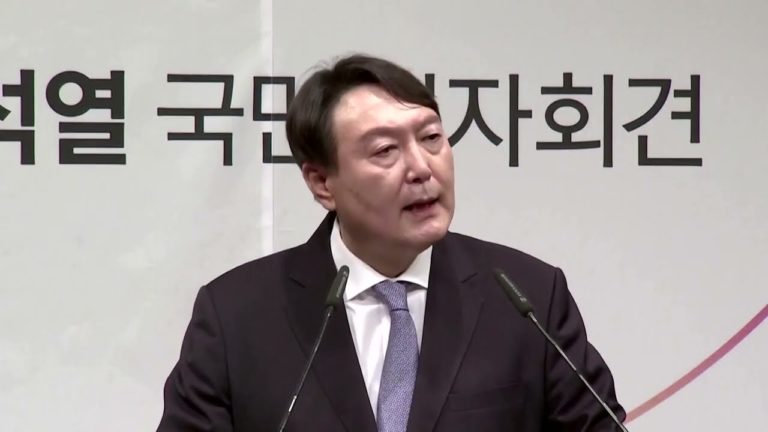In the wake of the election of the conservative People Party Power leader Yoon Suk-yeol, South Koreans mused on Twitter about immigrating to Canada.
He has been dubbed “K-Trump” by his detractors for his political promises which they claim are like those of former U.S. President Donald Trump who pledged to “drain the swamp”.
Read More Canada Immigration News
Immigrate To Canada In 2022: 5 Pathways To Permanent Residence
Top 10 Best Cities For Technology Jobs in Canada
Top 10 Source Countries Of Immigration to Canada in 2021
Yoon – like Trump – rode a populist wave to snag the presidency, promising a tougher stand towards North Korea, an end to graft, a more just society and a level economic playing field.
And much like Trump’s presidential win in 2016 led to many left-leaning Americans to say they would immigrate to Canada, so too are many South Koreans now vowing they will do the same on Twitter.
South Koreans Want To Come To Canada After Yoon Win
“Wow. The conservative candidate won the presidential election and now ‘immigration to Canada’ is trending,” tweeted on Ohioan living in South Korea. “Feels like 2016 all over again… (I want to go to Canada, too.)”
The Insider website claimed the former prosecutor’s presidential victory in South Korea led to people talking about immigrating to Canada on Twitter.
“Yoon’s win led some South Koreans to consider their immigration options – at least according to Twitter, where the term ‘immigration to Canada’ was trending on Thursday,” reported Insider. “Twitter analytics site GetDayTrends reported close to 16,000 tweets about the topic in the early hours of the day.”
Watch Video
The GetDayTrends Twitter analytics website does show the search term “Canadian immigration” hit 15,800 tweets for a very brief period of time in the early morning hours in South Korea on March 10. But that trend did not carry over into the rest of the day.
When Trump took the White House in 2016, left-leaning Americans reacted much more strongly to his electoral victory and many of them did, in fact, flee north and immigrate to Canada.
Canada Immigration Enjoyed Trump Bump
In the wake of Trump’s victory, Canada saw an almost 30 per cent increase in the number of Americans becoming new permanent residents to Canada. Many of those Americans who almost immediately contacted Canadian immigration lawyers were Muslims or members of the LGBTQ community who said they no longer felt comfortable living in the United States after Trump’s win.
With Yoon’s political victory less than a week old, it remains to be seen how many South Koreans may be prompted by that changing political climate to immigrate to Canada.
Certainly, there is a lot of opportunities for South Koreans to immigrate to Canada.
Ottawa open its doors to immigration even wider last month and announced the country will welcome 431,645 permanent residents this year, 447,055 next year, and 451,000 in 2024.
South Koreans eager to immigrate to Canada can seek permanent residence in five ways.
Under the Express Entry system, Canada receives immigration applications online. Applicants who meet eligibility criteria submit an online profile known as an Expression of interest (EOI), under one of three federal immigration programs or a participating provincial immigration program, to the Express Entry Pool.
Candidates’ profiles then are ranked against each other according to a points-based system called the Comprehensive Ranking System (CRS). The highest-ranked candidates will be considered for an ITA for permanent residence. Those receiving an ITA must quickly submit a full application and payment processing fees, within a delay of 90-days.
Skilled Workers Can Immigrate Through PNP
Then, there are the Provincial Nominee Programs (PNP). Under a shared jurisdiction between Ottawa and the provinces, Canada operates a two-tiered immigration system, offering programs for skilled workers, at both federal and provincial levels.
Through the PNPs, almost all of Canada’s ten provinces and three territories can nominate skilled worker candidates for admission to Canada with the specific skills required by their local economies. Successful candidates who receive a provincial or territorial nomination can then apply for Canadian permanent residence through federal immigration authorities.
Immigrant investors can also come to Canada under the Start-Up Visa program which can grant them Canadian permanent residence.
The program aims to recruit innovative entrepreneurs to Canada and link them with the Canadian private sector businesses, such as angel investor groups, venture capital funds or business incubators, and facilitate the establishment of their start-up business in Canada.
Third Of International Students Hope To Immigrate
A designated venture capital fund must confirm that it is investing at least $200,000 into the qualifying business. Candidates can also qualify with two or more commitments from designated venture capital funds totalling $200,000. A designated angel investor group must invest at least $75,000 into the qualifying business.
International students can also eventually get their permanent residence in Canada by first coming under a Study Permit, then applying for a Post-graduation Work Permit, and finally seeking their permanent residents by applying through the Express Entry system.
Canada welcomes more than 350,000 international students every year. To be eligible to study in Canada these students must demonstrate that they:
- have been accepted by a school, college, university or other educational institution in Canada;
- have enough money to pay for their tuition fees, living expenses, and return transportation;
- are law-abiding citizens with no criminal records;
- are in good health and willing to complete a medical examination, and;
- can satisfy an immigration officer that they will leave Canada at the end of their authorized stays.
Once issued a study permit, these students can work in Canada under the following categories:
- on campus without a work permit;
- off campus with a work permit;
- in co-op and internship programs, where work experience is part of the curriculum, with a work permit.
Upon graduation, a foreign student may apply for a work permit under the Post-Graduation Work Permit Program. Under this program, the work permit may be issued for the length of the study program, up to a maximum of three years.
Work Experience Can Be Gained Through PGWP
The valuable work experience gained while an international grad works in Canada under a Post-Graduation Work Permit can count towards a permanent residence application through Canada Express Entry system.
Under the Comprehensive Ranking System (CRS) used by Express Entry system programs, applicants for immigration are assigned points based on:
- Skills;
- Work experience;
- Language ability;
- Language ability and education of the applicant’s spouse or common-law partner;
- Possession of a job offer supported by a positive Labour Market Impact Assessment;
- Possession of a provincial government nomination for permanent residence, and;
- Certain combinations of language skills, education and work experience result in a higher chance of the applicant becoming employed (skill transferability).


